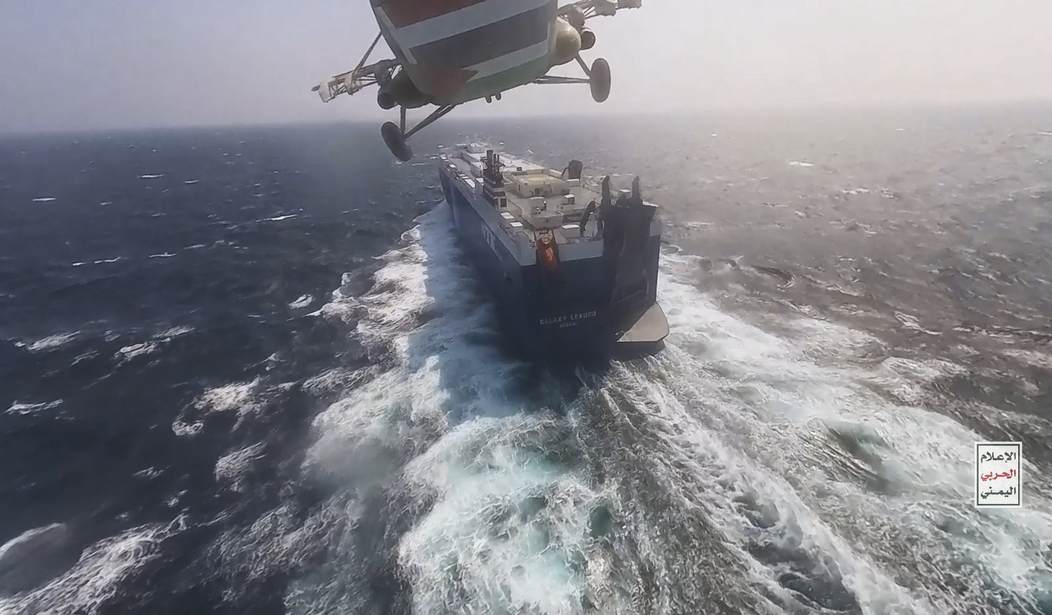Houthi attacks on shipping in the Bab el-Mandeb Strait threaten to increase the shipping cost of oil and natural gas and, hence, the world price of these commodities for everyone. The ominous English phrase for the strait is the "gate of grief," and that is the fate that has befallen an increasing number of ships, including container ships and tankers. "In 2018, an estimated 6.2 million barrels per day (b/d) of crude oil, condensate, and refined petroleum products flowed through the Bab el-Mandeb Strait... Total petroleum flows through the Bab el-Mandeb Strait accounted for about 9% of total seaborne-traded petroleum (crude oil and refined petroleum products) in 2017. About 3.6 million b/d moved north toward Europe; another 2.6 million b/d flowed in the opposite direction mainly to Asian markets such as Singapore, China, and India."
The Biden administration has put together an international naval task force to defend the shipping lanes. But it is unclear whether a force afloat can completely deal with what is essentially an array of anti-shipping batteries ashore. The Iranian-backed Houthis have a wide variety of munitions to attack shipping in the Strait. They include surveillance drones, loitering munitions, and tactical ballistic missiles launched from secure bases in Yemen. Time says, "Having now reached the brink of victory in their decade-long war with Saudi Arabia ... ensconced in mountain fortresses and flush with funds, the Houthis are heavily equipped with Iran-supplied arms, including accurate drones and anti-ship cruise and ballistic missiles capable of hitting a moving ship hundreds of kilometers away. Sitting on a large stockpile, they can keep up this campaign for a long time."
The problem ashore is rooted in the Saudi ground defeat in Yemen. A campaign to reopen the straits may ultimately involve a campaign to roll back the Iranian victory against the Saudis, or perhaps entail even war with Iran. Nothing would be less agreeable to the Biden administration, which has made a deal with Iran one of the cornerstones of its foreign policy.
A sustained air campaign would degrade Houthi capability, but that would go against the other key U.S. goal—preventing the regional crisis from escalating to the point that Iran becomes directly involved.
Central to Biden's reluctance to take on Iran is Saudi Arabia's vulnerability. The Saudis need protection from Tehran so badly they have actually explored partnering with China because of Beijing's perceived ability to restrain the ayatollahs. Meanwhile, "The United States is moving to reduce the gap in Saudi Arabia’s defense against Iran and its militias." Iran is now a major supplier of attack drones for Russia than in Ukraine, and nowhere is the Saudi inability to cope more evident than in Yemen. But Biden doesn't want to rile Iran up, not simply because of Iran's capabilities, but of who is behind them. From the beginning, events in Ukraine and Gaza were connected by a skein that ran through Moscow, Tehran, and Beijing. Now, the Bab el-Mandeb Strait has joined the pattern of a broad challenge to Joe Biden's international system.
As Max Hastings put it, there are now more wars than at any time since 1990. Only time will tell whether the uptick consists of just more local wars or the start of a big one.
This week, the International Institute for Strategic Studies in London published the latest edition of its authoritative annual Armed Conflict Survey, and it’s not predicting much peace for the holidays. It paints a grim picture of rising violence in in many regions, of wars chronically resistant to broking of peace. The survey — which addresses regional conflicts rather than the superpower confrontation between China, Russia, the US and its allies — documents 183 conflicts for 2023, the highest number in three decades.
He probably hopes it's not part of a pattern or else Joe Biden, the man who wanted to be remembered as the man who brought back normal, runs the risk of ending it.









Join the conversation as a VIP Member